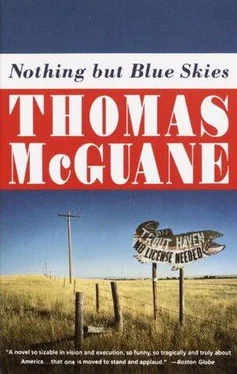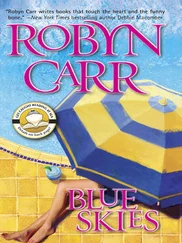Thomas Mcguane
Nothing but Blue Skies
For Annie, Heather and Maggie with love
“If you come to a fork in the road, take it.”
— YOGI BERRA
Frank Copenhaver put his wife Gracie’s suitcases in the back of the Electra and held the door for her. She got in. He walked around the front of the car gravely and he got in. He leaned forward over the steering wheel to look up at their house as though it were he, rather than Gracie, who was looking at it for the last time. A magpie flew across his view. It was a clue for Gracie in the event she didn’t realize that this was her chance. He didn’t want her, halfway to Arizona, to realize she had, in her sadness, forgotten to do this very important thing.
Once they were under way, he said, “We’ve got a few extra minutes, let me take the scenic route.”
“Oh, Frank, oh, please God no, not the scenic route,” said Gracie.
He was undeterred. As he drove, he chatted easily about the clash between Kellogg and General Mills over the seven-and-a-half-billion-dollar cereal business, realizing too late that it might seem to be an attempt to prefigure their own impending divorce and settlement. He tried to be almost too specific in fending off this parallel, running on about Cheerios and Wheaties and Rice Krispies and Raisin Bran; and, considering the state of their own lives, making far too much of Tony the Tiger autographing baseballs at Safeway stores.
Grade was dressed for travel, jeans, a cotton sweater tied around her waist, tennis shoes; her long black hair was braided and wound atop her head. She was at once weathered and pretty, remarkably girlish for the mother of a college student. She was wearing mountaineering glasses with leather side pieces. She didn’t seem to see much of the ordinary suburb and barely tightened her focus when Frank stopped in front of his — their — medical clinic on Alder Street and watched in apparent satisfaction as patients wandered in and out of its breezy, modern entryway. They had not owned the clinic long, and the many nursery aspens were still held up by stakes and wires; the beds of annuals had an uncanny uniformity. Frank took one more turn so that he could see the building from the side, then went on to the Kid Royale, his pet project.
The Kid Royale Hotel was a short walk from Deadrock’s old Territorial railroad station and was one of the monuments of the Montana frontier. Frank was going to restore it to its original glory, with its carriage bays and hitching racks and vaulted lobby. It was in poor shape now and stood with faded tobacco and soft drink advertisements painted on its side in a neighborhood that was giving way to transience and light industry. The success of this project would probably do more to endear Frank to this small city than anything. And it was only with the mildest of irony that he looked forward to his acceptance.
“Can we skip the mini-storage?” Gracie asked. “It’s getting late.” Frank was able to include the mini-storage facility in the scenic tour despite Gracie leaning disconsolately against the side of the car.
“You know,” he said, “it’s hard to believe, but there’s some five percent adjustable mortgages out there. Sometimes I think my bank is trying to put me out of business. You can’t always absorb these little things just to be courteous, let people nick you when they want. Like today, the Nikkei stock index plunged under the effect of arbitrage-related selling. This crap skids around the Pacific Rim in about four nanoseconds and scares hell out of little guys in Montana like me. Gracie, I hate to see you go. It’s been what, exactly?”
“A long time.”
“A long time. But Grace, you should have never done what you did. People don’t rise above things like that. Their marriages don’t.”
“I know, Frank.” As they reached the airport behind a stream of cars looking for short-term parking, Frank suddenly felt wild and unacknowledged conflicts in his breast. He had not spent enough time thinking about what this moment could mean. There was something spinning loose.
“Gracie, I just know you’re going to hit the ground running.” The thought that that might actually be true renewed his malice. “I’m going to focus on my business. Our situation has been so anti-synergistic that, to be completely honest, I expect to take off like a rocket as soon as you’re gone.”
“I bet you’re right.”
“If you get a chance, I’d like to see you salt a few bucks away in tax-deferred variable annuities, but that’s between you and whoever.” “Whoever” was like a drooling new face at Mount Rushmore.
“Thanks.”
Frank managed to catch a skycap’s eye. The skycap, a boy of about eighteen with long hair falling out of his cap, came to the driver’s side window where Frank gave him several bills. “Give the lady a hand with her luggage if you would.” Then he turned to Gracie, who was getting out of the car. “Goodbye, Grace. Give my regards to a town of your choice.”
“Goodbye, Frank.” Her cheeks were wet with tears.
He pulled away with a bizarre, all-knowing expression on his face, his hands parallel on the wheel and feeling, as he glanced in the rearview mirror too late to see Gracie enter the airport, that something inside had come completely undone. There was no chance to analyze her gait and try to determine if she was eager to get on the plane. There was no chance to collapse with grief and, perhaps, start all over again.
He had really thought he was adjusting to a changed Gracie but not an entirely new one. They had two cars but they never went anywhere in two cars before. They picked one and both went in it together, either Gracie’s unkillable Plymouth Valiant with its smooth-ticking little slant six or his low, domineering blue-black Electra with the insouciant lag shifts of its fluid-swilling transmission. Often Gracie slid over near him like in high school, elevating slightly on the spheres of her buttocks to touch her hair into place in the rearview mirror or put her hand high on his thigh. The Buick seemed like an old-time sex car, and unlike the light-spirited Japanese cars that had come to dominate things, the Electra still seemed to say, You’re going with me and you’re going to put out, period. The wanton deep pleats of its velvety upholstery invited stains. Recently, however, Gracie had begun to take the Plymouth for “time to think” on her way to her restaurant, Amazing Grease — sometimes, it seemed to Frank, with plenty of time to think. She had promised she would learn how to fish so that they would have more time together, but that plan went sour. He was quick to notice that things had changed but slow to realize what should be done about it. He reminded himself that he still had his health.
Frank buried himself not in his work but in fantasies of escape. He became a connoisseur of maps. He loved the history of maps and he felt drawn to the theory of the flat earth as the only one that adequately explained the disappearances common to everyone, especially death. He saw a kind of poetry in the spherical projections of the world as devised by Ptolemy. The more insistently the mystery of Gracie’s changed patterns intruded upon his thoughts, the more interested he was in the shrinking terrae incognitae of the old world; flat or round, what was the difference? Really, he often thought, what is the damn difference? It just seems likely that my parents, like other generations, milled around for sixty-eighty years and fell off the end.
He bought a scale model of a nineteenth-century surveyor’s carriage and had booked a trip with Gracie’s travel agent friend, Lucy, to visit the Royal Observatory at Greenwich, home of the Greenwich meridian, about the time Gracie hit the road without a map of any kind. By this time, the impending change had elaborated into a full-fledged human by the name of Edward Ballantine, a traveler and breeder of race horses, a resident of Sedona, Arizona, spiritual headquarters for Shirley MacLaine’s crystal people. Suddenly, Galileo’s discovery of the satellites of Jupiter, Newton’s announcement that the earth was flattened at the poles, even his simple pleasure at reading the mileage tables in his gas station, were out the window. He had never really thought about his wife leaving him. She was gone and he would never be the same again. He would never have a single second of time that was in any way continuous with his previous life, even if she came back, which was not likely. What good was his map collection now?
Читать дальше












